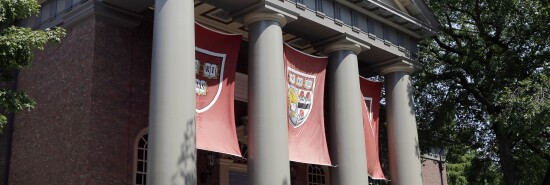
Harvard Crimson’s antisemitism disturbingly echoes Oxford in the 1930s
John Finley
Video Embed
On a cold February evening in 1933, the students of the Oxford Union debated and passed the motion “That this House will in no circumstances fight for its King and Country.” The debate, which took place a week or so after Hitler was named chancellor of Germany, became an international sensation.
The students’ pacifism and lack of patriotism was viewed as emblematic of the degeneracy of an ungrateful and self-indulgent young intellectual elite. Winston Churchill called the vote “abject, squalid, shameless,” and “nauseating.”
The Oxford Union debate was not simply an academic exercise. At the time, many observers claimed it reinforced the view in Germany that the English were soft.
Alfred Zimmern, professor of international relations at Oxford, wrote from Geneva to the former Oxford Union president responsible for the debate: “I hope you do penance every night and every morning for that ill starred Resolution. … If the Germans have to be knocked out a second time it will be partly your fault.” Churchill would later write that as a result of the “ever shameful” motion, “in Germany, in Russia, in Italy, in Japan, the idea of a decadent, degenerate Britain took deep root and swayed many calculations.”
In our own time, just 18 months ago, the academic aristocracy at the Harvard Crimson endorsed the boycott, divestment, and sanctions movement that targets Israel. The BDS movement arose in 2005 as a policy advocated by Palestinian civil society groups to delegitimize and isolate Israel, similar to the anti-apartheid fight against South Africa.
As was the case with the Oxford Pledge, the publication of the Harvard Crimson’s editorial immediately attracted national media attention. The editorial argued that BDS could help the Palestinian cause in the same way that BDS won liberation for black South Africans.
The breathtaking scope of the proposed academic, cultural, and economic boycott of Israel would, for example, ban Israel from the Olympics, withdraw American and other foreign investments in Israel, and suspend Israel from the U.N.. A few years ago, the German Parliament designated the BDS movement as antisemitic.
A principal objective of the boycott is to pressure Israel to agree to a right of return for approximately 7 million Palestinians. While the concept of a “return” may have a superficial appeal to some in the international community, such a position, if now implemented, would be a demographic Trojan horse that would destroy Israel.
While the destruction of Israel as a Jewish state was not explicitly stated in the editorial, it spoke approvingly of the “the spirited activism” of the Harvard College Palestine Solidarity Committee. A week or so before the editorial appeared, this committee hosted the Annual Israeli Apartheid Week which featured, as the Harvard Crimson described, a “colorful, multi-panel Wall of Resistance” located in Harvard Yard.
The Harvard Crimson was “broadly and proudly” supportive of this “Wall of Resistance,” which contained such slogans as “Settler Colonialism,” “White Supremacy Apartheid,” and “Zionism is Racism” (the last being repealed by the U.N. in 1991).
The editorial cynically sought to conflate Israel and South Africa by citing the apartheid allegations of Amnesty International without noting that Amnesty International acknowledges Israel’s systematic treatment of the Palestinians is not comparable to South Africa’s system of racial supremacy. Indeed, the European Commission recently concluded that “it is not appropriate” to tag Israel with the apartheid label.
The Harvard Crimson, the most respected college newspaper in the world at one of the most celebrated universities in the world, proclaimed in the editorial their “proud” embrace of BDS juxtaposed, without context, against a gratuitous reference to Israeli soldiers having killed Palestinian children. The acceptability of the opinion expressed in the editorial was only reinforced when the president of Harvard, who has since stepped down as planned, refused to comment on the BDS editorial as a matter of policy.
Under such circumstances, there was an inevitability that, immediately following the atrocities committed by Hamas, the Harvard College Palestine Solidarity Committee would feel comfortable in organizing a joint letter of 35 student organizations that stated the “apartheid regime is the only one to blame” for the massacre of its own citizens by Hamas.
With the onset of World War II, the Oxford Union resolution was shown to be wrongheaded and dangerously naive. Indeed, the proposer of the resolution, Kenelm Digby, would go from back-slapping congratulations on carrying the motion to spending the war in a Japanese internment camp. Ultimately, he would be freed by the armed forces of one of the members of the British Commonwealth of Nations, Australia, with King George V as its monarch.
As bigoted and incendiary speech has erupted in Harvard Yard and other campuses following Hamas’s unprecedented terrorist attack, history will also judge the Harvard Crimson BDS editorial to be ill-considered and ignominious. University student editorials that selectively target Israel for demonization and delegitimization, whatever their intellectual gymnastics, cannot be separated from campus antisemitism.
And the Harvard Crimson’s BDS editorial can’t be separated from 35 Harvard student groups rationalizing what they know to be evil.
CLICK HERE TO READ MORE FROM THE WASHINGTON EXAMINER
John Finley is chief legal officer at Blackstone. He graduated from Harvard Law School in 1981 and is a member of the Dean’s Advisory Board at Harvard Law School.
